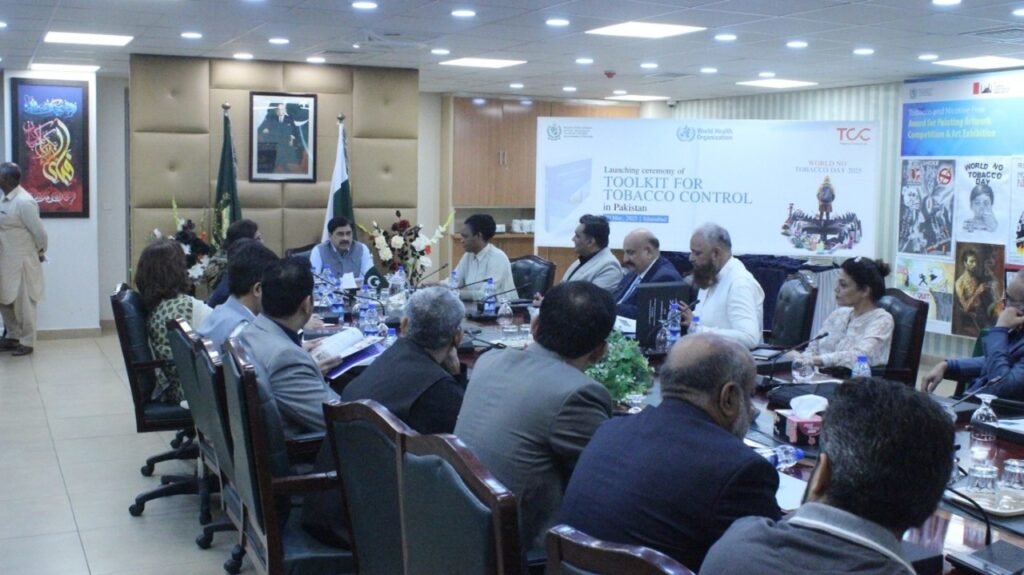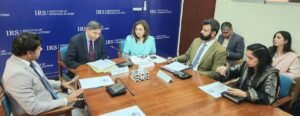
WHO, the Ministry of Health and partners join forces to combat the health and economic burden of tobacco in Pakistan
Islamabad – On the occasion of World No Tobacco Day, Pakistan’s Ministry of Health and the World Health Organization (WHO) announced strengthened collaboration to tackle the devastating economic and health impacts of tobacco, which causes 164 000 deaths and economic losses of PKR (Pakistani Rupees) 700 billion – approximately US$ 2.5 billion – each year.
WHO and the Ministry of Health emphasized that all tobacco products on the market, without exception and regardless of the manufacturer, are extremely harmful to health and pose a major risk to vulnerable populations such as children and teenagers.
Additional Secretary Health chairing the launching ceremony of the Tobacco Control Toolkit during the celebration of World No Tobacco Day 2025 at the Ministry of Health in Pakistan.
During an event held at the Ministry of Health in collaboration with WHO and partners, Pakistan’s authorities and WHO renewed their commitment to work together on urgent and sustainable measures to save lives. Measures include long-term increased taxation, advertising bans, regulation on plan packaging and product design to reduce appeal – specially to vulnerable populations such as children and teenagers, tobacco and nicotine-free public spaces, strict enforcement of tobacco control laws, and medical support for those who want to quit.
On the occasion, the Ministry, WHO and partners also launched the Toolkit for Tobacco Control in Pakistan, developed by the Tobacco Control Cell in partnership with tobacco control stakeholders. Dr. Shabana Saleem, Director General Health, warmly welcomed all stakeholders at the launch ceremony. Dr. Arsalan Hyder, the National Focal Person, then briefed the participants on the key features of the Tobacco Control Toolkit. The toolkit is designed for focal persons, master trainers, authorized officers, and law enforcement personnel to support the achievement of the Sustainable Development Goal 3.a to strengthen the implementation of WHO Framework Convention on Tobacco Control in all countries.
“As a proud signatory to the World Health Organization Framework Convention on Tobacco Control, Pakistan remains firmly committed to implementing comprehensive, evidence-based measures to reduce tobacco use. I want to thank all our partners, including WHO, for their unwavering support. Together, let us work toward a tobacco-free Pakistan, a nation where our people can live, work, and thrive in an environment that values health, safety, and well-being,” said Additional Secretary of Health Laeeq Ahmad.
Research has shown that measures such as tobacco taxation are effective in increasing revenues for the Government while also reducing consumption, tobacco-related diseases, and pressure on health systems.
Pakistan ratified the World Health Organization Framework Convention on Tobacco Control (WHO FCTC) in 2004, and WHO provides continuous technical support to the Ministry of National Health Services Regulations and Coordination and the Federal Board of Revenue in areas such as tobacco tax policy and track-and-trace implementation.
Dr. Arsalan Hyder, National Focal Person for WHO FCTC, briefing the salient features of the Tobacco Control Toolkit during the celebration of World No Tobacco Day 2025 at the Ministry of Health in Pakistan.
“The 164 000 people dead to tobacco every year are not just numbers. They are workers with families. They are sons and daughters. They are also teenagers and children, who are particularly vulnerable and an easy target for the advertisement of the tobacco industry. Let us unmask the appeal. Tobacco is not a candy; it is a killer, and we need to protect our children, our families, and our communities,” said WHO Deputy Representative in Pakistan Ellen Thom.







